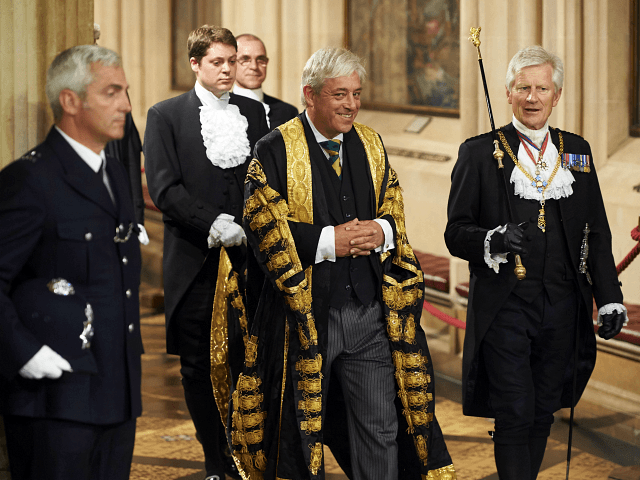Speaker of the House of Commons John Bercow has shocked Brexiteer MPs by selecting four pro-Remain amendments for tonight’s vote, while not selecting a cross-party amendment to stop a potential second referendum.
Some 127 leave-supporting Members of Parliament backed Amendment B, tabled by Conservative Lee Rowley, which sought to add to the motion to be voted on Thursday night that “the result of the 2016 EU referendum should be respected and that a second EU referendum would be divisive and expensive, and therefore should not take place.”
Speaker John Bercow selected of the 11 amendments put forward four — all of which in some way attempts to delay, frustrate, or stop Brexit:
- Amendment H, tabled by Tory Remainer Sarah Wollaston, calls for an extension to Article 50 to allow for time for a second referendum;
- Amendment I, tabled by Labour Remainer Hilary Benn, would allow MPs to take control over Brexit from the government and hold votes on Brexit alternatives, which could include a second referendum;
- Amendment E, tabled by the Labour Party, seeks to extend Article 50 until MPs agree on a consensus on Brexit;
- and Amendment J, tabled by Labour Remainer Chris Bryant, blocks Prime Minister Theresa May from putting her Withdrawal Agreement to the House for a third time.
Tory Brexiteer Mark Francois raised a point of order expressing “some disappointment” that the Speaker had not selected Amendment B, “which had the support of 127 member of this House including the entirely of the DUP, 13 members of the Labour Party, one independent, and the rest Conservative. It had far more than any other on the order paper with three different parties’ support.”
Saying that he would not go into detail as to why he did not select the only amendment seeking to rule out a second referendum, Mr Bercow said, “It is not uncommon for a member of this House to be mightily pleased when his or her amendment is selected and notably displeased when it is not.”
“Members do have to take the rough with the smooth,” he added.
In January, Bercow had been accused of breaching Commons precedent by allowing MPs to vote on an amendment intended to derail a clean, no-deal Brexit — allegedly against the advice of clerks advising on Parliamentary procedure.
Wednesday night’s vote on ruling out a no-deal Brexit exposed the level of disruption a vote on an amendment to a government motion could cause, when the Spelman amendment, which was designed to remove reference to leaving without a deal remaining the default option, was passed by a slim majority of four, 312 to 308, altering the government’s motion.
As a result, the government found itself whipping Tory MPs to vote against its own motion — with Prime Minister Theresa May seen voting against it and for leaving with No Deal — but to no success, the amended motion passing a comfortable 321 to 278.
The House of Commons is set to vote tonight on the motion seeking to ask Brussels for an extension to Article 50 if Mrs May’s Withdrawal Agreement is not voted for by March 20th, the motion reading, “the Government will seek to agree with the European Union a one-off extension of the period specified in Article 50 for a period ending on 30 June 2019.”
If the deal is not passed by then, the UK would need a longer extension, with reports that the UK is making contingency plans for European Parliament elections.
However, the EU has been clear that it would not grant an extension without a plan, with European Parliament President Antonio Tajani suggesting last week such options could be plans for a general election or second referendum.

COMMENTS
Please let us know if you're having issues with commenting.